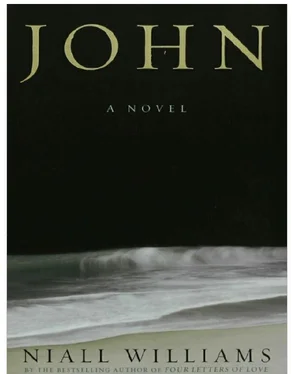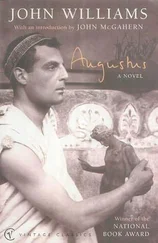On my lips is the prayer I confess from weakness: Make me to see again. Make me vigorous and whole that I may go about as I please and seek out those who betray you and be again as I once was. Let me show you the love I carry like breath all this ancient lifetime, the love that is yet like a sword that would cut down your enemies.
If I could see.
Let me serve you again with strength of body.
If your hour is not yet at hand, let your servant see again and stand fortified. I would hold what is. I would I were a better servant. Through my fingers now falls the water.
The Apostle sits in the inner cave, Linus by the entrance. He has returned from speaking with Ioseph and his spirit is low. Not because he has learned of the heresy spreading, for he knew this, but because he feels his physical weakness and wishes for the strength of youth, and because in him rage finds no release. The bones of his knees grind together as he moves from the stool and kneels. Suddenly the entire of him is racked with aches. They announce in his bones, in the bending and straightening, in the pulling and flexing of aged ligature. His elbows, from the near infinitude of crooking for prayer, are most comfortable foreshortened, as though his arms are wings folded in front. Each knuckle is swollen with small purses of pain. At the thin joints of his wrists are risen knobs, lumps of discomfort. His back curves, as though some force he resists bends him toward the ground. Here in his neck is a knife pressing; it advances if he tries to lift his head toward the sky. So he stoops forward, holds pressed and cupped the flimsy flesh of his hands, wherein seems a nest of bones. There is the pain of years, time itself a hurt that sings without relent. It is about him, an everywhere. He does not seek the source of it, or a remedy. But instead takes the dolour as a condition of living, the near century of his continuance. It is moments only, as he kneels, the pain orchestrating along the various podia of his body, before the Apostle can pray himself beyond.
He prays the first in words, as if he speaks personally, and knows that he is heard. But soon, to escape the hurt of time, he escapes time and is silent and drifts from the space, and is no longer present to the cave but restored to his own youth and the most meaningful days of his life.
He has scenes of extraordinary clarity. He can feel the sun of a certain day, the dust of the road. A bird he did not know he saw. But these moments are in disarranged order in his mind. He has poor remembrance of their chronology, and this is burdensome on his heart. The record that he is wears away from the inside. But this will not matter if the Lord comes soon. He will have endured; he will have remained behind as witness until the Second Coming.
So, hands held together, as if cupping a small bird of faith, he visits a morning of sunlight.
We were on the road. Coming back into Galilee for the second time. We had been in Samaria and you had met that woman at Jacob's well. The woman with her water pot; the others could not understand why you would speak to her.
'Sir, I perceive thou are a prophet,' she said.
'God is a spirit, and they who worship him must worship him in spirit and in truth.'
'A messiah is coming,' she said.
'I who speak unto thee am he.'
And afterward she went to the city proclaiming, and from there men had come to see. They had asked of you to stay, and two days we had tarried there, all of us strangely welcomed in that unwelcoming city.
Then, a morning of sunlight.
Come.
We left and walked back out of Judea into Galilee.
We were changed then. Already as we walked on that road we were other than ourselves. Andrew had put away his foolishness. Philip was older than himself. Peter. Peter walking as if carrying on his shoulders a burden, a building. Speaking nothing at all. We were returning to our own place, but with gravity, with import now. We knew we would come across others who had known us before. We were aware there would be judgement.
This in the sunlight on the road. Your step, light and long and purposeful. Always.
A prophet hath no honour in his own country.
So why then were we returning?
We did not ask aloud. We followed.
You followed, too. What was written before in scripture. You now like a reed in another's hand going along the letters toward the last word.
A high eagle I saw overhead us. It flew without wing-beat, gliding the blue ridges of the sky. I lost it and found it again. And again. All that day the eagle accompanied us. Watchful. Where we passed caravans and merchants, tent makers, a herdsman with goats, women bearing bundles, baskets of olives, the eagle remained above.
We were watched over thus. In the hot sunlight on the road.
I thought to ask if you saw it. I was young. I was a youth. But knew not to ask.
A wind arose though the sky was blue. It came across the barren land and whirled the sand in circles dancing. A herdsman hurried with his goats. A copper bell rang. We walked on, dust and sand blowing, our garments pressed back against us and fluttering behind as though we were aflame. The windstorm followed us. Blind whirl of sand. James looked to me and offered his hand. I did not take it. I wanted my brother to know I was a man. Our faces burned, skin sanded. You did not stop. You did not say we should take shelter and let it pass over, but walked on, the storm no more than a dream.
It passed as quickly as it came. Above us again, the eagle.
We came into Cana of Galilee once more. The word had gone before us, and it was not as before at the wedding feast. There were rumours of miracle. There were stories of you. There were tellers whose words were wild and far from truth. There were some who told for their own purposes. Who told so that they might watch the eyes of the Sadducees and the anger redden. Some, who had come ahead from Samaria, told of the woman near Jacob's well, and told, too, that you had said, 'Believe me, the hour cometh when ye shall neither in this mountain nor yet at Jerusalem worship the Father.'
So it was reported.
Already there were words spoken against this.
When we walked into Cana, I wondered why we had come back.
But we followed you, and did not ask.
The narrow curve of the street, the low white buildings giving small shade.
We walked past whispers. 'He is the one from the wedding feast. He is the one.'
I looked all in the eye. I would have struck any that spoke aloud against you. I would have drawn a knife and bled them.
So wild is love.
The band of us, the twelve, coming into Cana, into the cool of the shade. Where were we going? What was our purpose there?
The deep faith we had that it would be revealed.
And was.
We sat by steps, a sprawl of men, and drank after the long journey. There gathered a small crowd. They watched to see if a miracle would happen. They whispered among themselves. Bring water. He may make the water wine again. Quick, bring water. Bring water. He is the one. He is a magician.
We were magician's followers.
He is a teller of fortunes.
We were the fortune-teller's followers. We had left our families to follow a fortune-teller. We were no wiser than children, some laughed. No wiser than foolish children.
One brought a stone jar of water. Others water bags.
'Sir, I would have wine for my guest this evening.'
'Sir, wine. Please make this wine. Wine, sir. Wine.'
In this your gentle composure. Like water untroubled in a deep pool. Waiting.
'Master,' Peter said, after the long journey, 'eat.'
But you said, 'I have meat to eat that ye know not of. My meat is to do the will of him that sent me, and to finish his work.'
We sat in the street shade. The Canaanites waited for their miracle. I watched the sunlight retreat on the stone wall of the house of Eli. The blue of sky with nothing in it, the eagle gone.
Читать дальше










